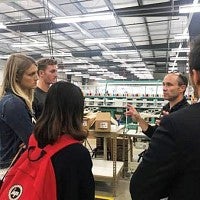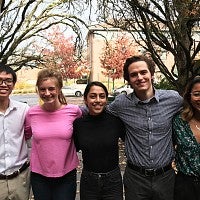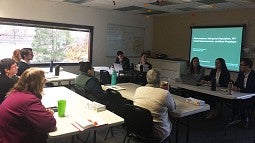The University of Oregon's student-run Oregon Consulting Group works with companies and nonprofit organizations to provide professional deliverables. During the fall term of 2018, the group's student consultants took on four new projects focused on marketing strategy, financial modeling, market sizing, and growth strategy.
University of Oregon Central Power Plant
An Oregon Consulting Group team created a financial model in Microsoft Excel for the University of Oregon's central power plant, forecasting production costs for strategic decision-making. Project manager Tucker Leneve relied heavily on the group's ability to leverage their technical skills with financial modeling and Excel, developing an easy-to-use tool that the client could leverage for the foreseeable future.
“The project forced me to think critically about how different formulas could fit together as a whole to continually improve the model. I learned that I could achieve any task or goal I had with some persistence and determination," said consultant Shaheen Safari.

Pacific Headwear
The Pacific Headwear team led by project manager David Pulaski performed market research to identify growth opportunities in the competitive on-field and adventure/casual off-field headwear market in the United States. Through perception evaluation, problem recognition, and idea generation, the team provided a comprehensive analysis of growth opportunities for the client. The project involved extensive secondary and primary research, and strategy workshops to eventually propose recommendations ranging from competition to customer service.
“When little information is readily available, learning how to manage information flows and eventually solve problems is crucial for developing recommendations," said consultant Natalie Kinsel.

University of Oregon Housing
The UO Housing project team was tasked with developing a plan to increase the number of annual housing returners. The team, led by project manager Jens Johnson, evaluated the existing perception around returning to on-campus housing by creating a survey, identified patterns through qualitative data analysis and focus groups, and developed a marketing plan using that research. The final deliverable resulted in a scalable, retention-focused marketing strategy that included a journey map of a student's first year on campus.
“Going out of my comfort zone to do something creative involving a lot of human-centered design was a new experience. Developing a marketing plan for my client this term was a unique opportunity that ended up benefiting me and I learned that I don't immediately need the skills that I think I do to excel at a client deliverable," said consultant Hanaa Mohammed.
Womenspace

Womenspace, a nonprofit that provides domestic violence support services in Lane County, retained the group to establish the size of the homeless women population in the Eugene/Springfield area. The client and the project team concluded that the existing information on the topic was not complete and was missing many key groups of people. Project manager Chase Dun led his team in identifying gaps in current methodologies, interviewing field experts, and conducting an uncertainty analysis of key demographics.
“The process really illustrated the persistence and determination of the people on our team and gave us an insightful look into the work we were doing and how our recommendation would have a tangible effect in the community," said consultant Callum Kuo.
—Haydn Zhang and Braxton Williams, Oregon Consulting Group

